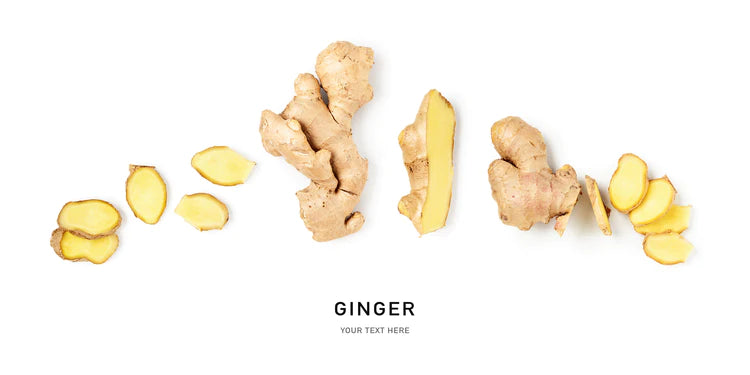hikma was born from the desire to reintroduce personal and collective rituals into your lifestyle. We understand the tradition and science of pure botanicals—and how to formulate them for a better way of living. Inspired by both knowledge and legacy, hikma’s products are expertly developed in small batches with formulations that are stripped back to the basics—allowing those all-natural ingredients to take center stage.

Ginger
Zingiber officinalis
Common name: Ginger
Arabic name: زنجبيل
TCM name: Sheng jiang
Ayurvedic name: Adrak
Family: Zingiberaceae
Parts Used: Rhizome
Actions:
Antiviral
Anti-inflammatory
Carminative
Antispasmodic
Circulatory Stimulant
Radioprotective
Taste: Spicy
Energy: Warming
Native To: South Asia
Geographic Distribution: South Asia, East Africa, the Caribbean, India, Europe
Botanical Description: A reedy, leafy stemmed perennial that grows up to 2 feet, ginger shoots up a tall stem in the spring and has lanceolate leaves. The flower stalk grows from the root and at the tip, develops an oblong and scalloped spike from which white or yellow flowers blossom.
History and folklore: Medicinal uses are detailed extensively in early Traditional Chinese Medicine and Indian medical texts as well as ancient Roman, Greek, and Arabic traditions.
Uses: Ginger is a warming herb with a fiery nature. By stimulating circulation and energy, it enhances the "fire" in the body that supports digestion, heart health, immunity, and reproductive system vigor and balance. Its warming nature is especially good for cold, damp, and stagnant conditions. A cup of ginger tea will warm a body chilled by weather or the flu, and its diaphoretic (sweat-inducing) ability can also cool an overheated or feverish body. By relaxing the muscles surrounding the arteries and then stimulating arterial circulation, ginger delivers warmth to the body’s extremities, either warming cold hands and feet or promoting sweating that helps cool the body. Combined with the antimicrobial properties and ability to thin mucous and support expectoration, this temperature modulation ability makes ginger an effective ally for supporting those with colds and flu. Ginger’s volatile oils stimulate the immune system to fight bacterial and viral infections. Ginger’s antiviral actions include stimulating macrophage activity, preventing viruses from attaching to cell walls, and acting as a virucide. Ginger is perhaps best known as an anti-spasmodic that alleviates nausea, motion sickness, and morning sickness. This effect is attributed to the relaxing nature of its aromatic oils. Ginger is also a carminative and digestive aid. By warming the stomach, it improves digestion, bile secretion, fat digestion, and movement of food through the digestive tract, reducing stagnation, irritation and gas. The warming, stimulating, and anti-spasmodic nature of ginger is also helpful for menstrual cramps and painful ovulation, promoting menstruation
Safety: Ginger may interact with certain medications like warfarin, and medications for diabetes and high blood pressure. Ginger may increase risk of bleeding. Traditional Chinese Medicine practitioners caution women who are pregnant not to use more than 2 grams of dried ginger a day.

